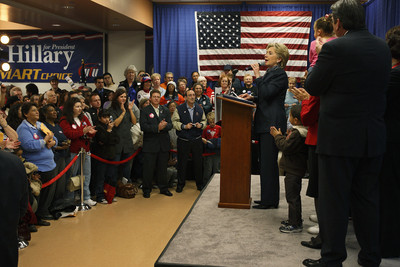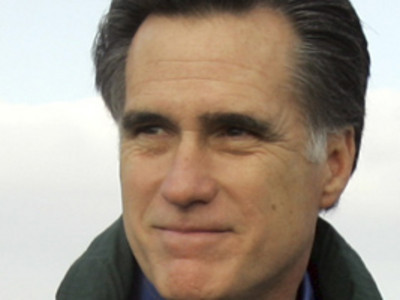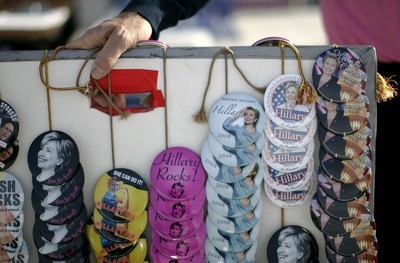Clinton, Hispanic voters, unions proclaim bond
Hillary Clinton on Saturday told Las Vegans that what America needs is "not just a change of direction but a change of heart."
The roomful of about 150 at a union hall greeted her with chants of "Sí, se puede" -- "Yes, we can" -- the same refrain that Clinton's rival Barack Obama was chanting the day before.
The two rivals, who are fighting hard for an edge in this week's Nevada caucuses, appear to agree on something: that the workers' motto is the key to Nevadans' hearts and votes.
Onstage with Clinton Saturday were a passel of Hispanic luminaries, including four members of Congress, a U.S. senator, two Nevada Hispanic legislators, former Housing Secretary Henry Cisneros and two national Hispanic leaders, Raul Yzaguirre, founder of the National Council for La Raza, and Dolores Huerta.
Lest one accuse Clinton of copycatting Obama, Huerta might lend her credibility: She was the one who came up with the slogan back in the 1970s, along with Cesar Chavez, when they led the United Farm Workers fight for migrant workers' rights.
All of Clinton's recent appearances in the state have been aimed at Hispanics: a neighborhood canvass and a talk at a Mexican restaurant on Thursday, the "Juntos con Hillary, una vida mejor" (together with Hillary, a better life) rally Saturday morning and another Mexican restaurant appearance Saturday afternoon in Reno.
Obama's events have not been so targeted. On Friday, he held rallies with the Culinary union and members of the general public. He returns today to appear again at the Culinary hall and proceeds to Pahrump, where his town hall is open to local residents.
Increasing the clout of Hispanic voters was a major reason Nevada got a voice in the Democratic presidential nominating process. The Nevada caucus on Saturday stands to break a tie, in states won, between Clinton and Obama at this early date.
But courting Hispanics nearly exclusively is a gamble for Clinton. They represent an estimated 15 percent of registered Democrats, and historically haven't turned out to vote as an influential bloc.
The other group Democrats wanted to highlight in Nevada was unions. Clinton, Obama and John Edwards all have blocs of union supporters, but it is Obama who scored the most coveted prize in Culinary, which is Nevada's largest union and the one most practiced at political orchestration.
The Democrats catered to labor here by creating nine "at-large" caucus sites on the Strip, where workers can caucus on Saturday rather than commuting back to precincts near their homes, where everyone else is required to be. The rationale was that those most likely to be working on a Saturday in Las Vegas' 24-hour economy are Strip workers.
On Friday, a federal lawsuit was filed against the Nevada Democratic Party alleging the caucus sites violate Nevada election law and allocate a disproportionate amount of delegates to those who attend them. The lawsuit points out that workers off the Strip don't get the same consideration.
Bringing the lawsuit is the teachers union, the Nevada State Education Association, along with some individual Democratic activists. The teachers have not endorsed a candidate.
Attempts to reach the plaintiffs were unsuccessful.
The state Democratic Party has not yet filed a legal reply. The party said in a statement that the precincts are "fair, legal and proper" and that their creation was overseen by lawyers and members of the state and national parties.
The state party noted in its statement that the presidential campaigns all have known about the precincts for months. "The time for comment or complaint has passed," the party stated.
The party didn't offer legal arguments, but the U.S. Supreme Court has held that states do not have the authority to dictate how political parties choose their nominees.
The Clinton campaign denies involvement in the lawsuit, which if successful would make it harder for Culinary workers to caucus and thus potentially hurt Obama.
"We don't have a position on the lawsuit. We don't want to get involved," Clinton spokeswoman Hilarie Grey said. "We're planning for any eventuality, and we'll adjust our get-out-to-caucus (operation) whichever way the court decides."
Culinary's secretary-treasurer, D. Taylor, called the lawsuit "despicable and disgusting" and an obvious political ploy given the timing shortly after the union announced its endorsement.
"This is an attempt to disenfranchise people who wait on tables and make beds and cook food, largely women and people of color," Taylor said.
He noted that Clinton has repeatedly voiced concern about the workers disenfranchised by the caucus process' requirement of in-person, on-time participation and called on her and her supporters to renounce the lawsuit.
None have so far. "Their silence is deafening," Taylor said.
He said the union has not formulated a specific response to the lawsuit but will not allow it to succeed "without a fight."
Taylor also noted that more than 40 percent of the union's members are Hispanic. "Certainly, we are going to talk to our members that there are people who tell them they are supportive and then don't want them to be able to vote," he said. "Nothing gets people more angry than someone telling them they don't have the right to participate."
David Cohen, the Obama campaign's Nevada state director, said in a written statement: "We believe as a party, and a country, we should be looking for ways to include working men and women in the electoral process, not disenfranchise them."
Clinton on Saturday didn't take questions or address the issue. She told the crowd she would not be an ally of convenience.
"It's critical that Nevadans pick someone who won't forget them," she said. "We need a president who doesn't just come and ask for your support in a caucus, but will be there for you, day in and day out."
Cisneros' endorsement came after New Mexico Gov. Bill Richardson, whom Cisneros had been supporting, dropped out of the presidential race on Thursday. It gave Clinton occasion to eulogize Richardson, who is widely considered a potential running mate for the eventual nominee and who hasn't endorsed another candidate.
Richardson had an active campaign in Nevada, so his absence from the race put his supporters up for grabs by the remaining candidates.
Calling Richardson a longtime friend, Clinton said, "He broke through a barrier by running for president, and raising so many important issues for our country."
She lauded Cisneros, a former mayor of San Antonio, and said she was concerned about the economic insecurity many people feel.
Cisneros, for his part, emphasized to the audience the importance of their participation. "I have great hopes for the role the American Latino population will play in this country," he said, adding, "So much of this is in your hands. The country is watching Nevada."
Even before Richardson, who is Hispanic, left the race, polls had shown high support for Clinton among Hispanics. Many say they have fond memories of her husband's administration, in which Cisneros served, although Cisneros left the Cabinet amid personal and legal scandal.
"I want her to be president because I think she can help Mexicans," said Jose Sarabia, 49, who attended Saturday's event and plans to caucus for Clinton. "There are a lot of problems with immigration, and if she is president, I think she will help us."
Esther Garcia, 67, said Clinton appeals to her because she doesn't appear to think she's better than anybody else.
"She has not forgotten the lower class people," she said. "She does not look down on us."
Contact reporter Molly Ball at mball @reviewjournal.com or (702) 387-2919.
POLITICS SECTION Candidate Profiles, How to Caucus MICHIGAN POLL Mitt Romney -- 30% John McCain -- 22% Mike Huckabee -- 17% Fred Thompson -- 7% Rudy Giuliani -- 6% Ron Paul -- 5% Duncan Hunter -- 1% Alan Keyes -- 1% Undecided -- 11% Of those who decided, 39% said they might change their minds Which ONE of the following issues do you feel is MOST important: Economy & Jobs -- 34% National Security or Terrorism -- 22% Taxes & Government Spending -- 15% Moral & Family Issues -- 13% Immigration -- 9% Iraq -- 4% Other/Not Sure -- 3% 400 likely Republican primary voters were interviewed by telephone January 9-11, 2008 by Mason-Dixon Polling & Research, Inc. of Washington, D.C. The margin for error is ? 5 points. THIS WEEK: MICHIGAN REPUBLICANS VOTE TUESDAY, SOUTH CAROLINA REPUBLICANS VOTE SATURDAY, AND NEVADA DEMOCRATS AND REPUBLICANS VOTE SATURDAY.






























